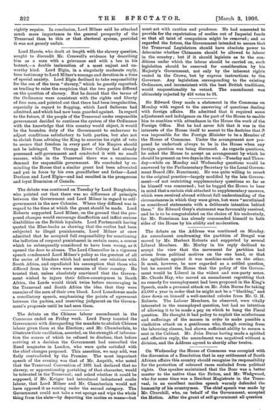The debate on the Chinese labour amendment in the Commons
ended on Friday week. Lord Percy taunted the Government with disregarding the mandate to abolish Chinese labour given them at the Election; and Mr. Chamberlain, to illustrate their vacillation, asserted, on the strength of informa- tion the source of which he refused to disclose, that before arriving at a decision the Government had consulted the Rand magnates in London, who were quite satisfied with the thief changes proposed. This assertion, we may add, was flatly contradicted by the Premier. The most important speech of the evening was that of Mr. Asquith, who noted that the Transvaal Convention of 1881 had declared that no slavery, or apprenticeship partaking of that character, would be tolerated in the Transvaal; and asked whether it could be supposed, if Mr. Kruger bad introduced indentured coolie labour, that Lord Milner and Mr. Chamberlain would not have opposed it as coming under the second category. The Government could not take a wet sponge and wipe the whole thing from the slate—by deporting the coolies on masse—but must act with caution and prudence. He had consented to provide for the repatriation of coolies out of Imperial funds so that all taint of compulsion might be removed ; and as regarded the future, the Government intended to secure that the Transvaal Legislature should have absolute power to determine whether Chinamen should be allowed to labour in the country ; but if it should legislate as to the con- ditions under which the labour should be carried on, such legislation should be reserved for consideration by his Majesty's Government, not only by the inherent rights vested in the Crown, but by express instructions to the Governor. Any legislation corresponding to the existing Ordinance, and inconsistent with the best British traditions, would unquestionably be vetoed. The amendment wail ultimately rejected by 416 votes to 9L














































 Previous page
Previous page